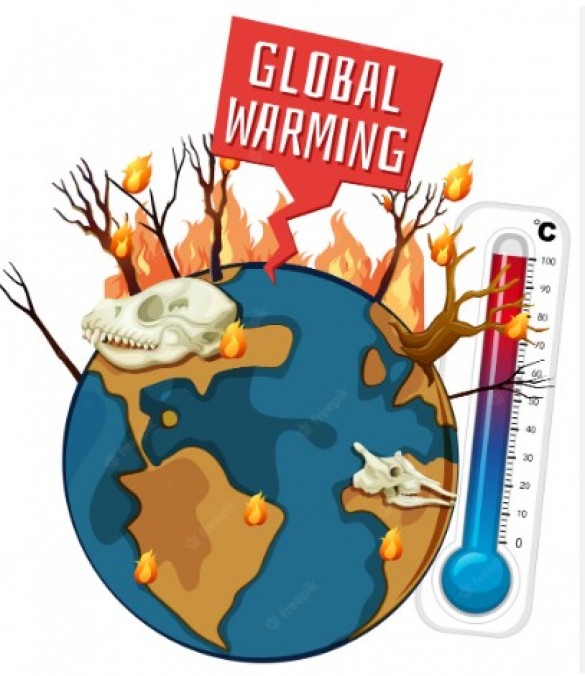
Global Warming: Understanding the Causes, Impacts, and Solutions
Global warming has emerged as one of the most pressing environmental challenges of our time. The Earth's climate is undergoing significant changes due to human activities, primarily the release of greenhouse gases into the atmosphere. This article +aims to provide an in-depth understanding of global warming, including its causes, impacts, and potential solutions.
I. Causes of Global Warming
Global warming is primarily caused by the increase in greenhouse gases, such as carbon dioxide (CO2), methane (CH4), and nitrous oxide (N2O), in the Earth's atmosphere. The main sources of these gases include burning fossil fuels for energy, deforestation, industrial processes, and agricultural practices. The accumulation of these gases traps heat in the atmosphere, leading to a rise in global temperatures.
II. Impacts of Global Warming
Global warming has far-reaching consequences for the environment, ecosystems, and human societies. It is contributing to the melting of polar ice caps and glaciers, leading to rising sea levels. This poses a significant threat to coastal regions, with increased risks of flooding and erosion. Furthermore, altered weather patterns, such as more frequent and intense heatwaves, droughts, storms, and precipitation extremes, are becoming more common.
The impacts of global warming are also evident in ecosystems. Coral reefs, for instance, are highly sensitive to temperature changes, and rising ocean temperatures are causing coral bleaching events, leading to the loss of biodiversity. Additionally, shifts in climate conditions are affecting species distribution, disrupting ecosystems' delicate balance.
On a societal level, global warming poses challenges to food and water security, public health, and economic stability. Changes in rainfall patterns can result in crop failures and water scarcity, threatening agricultural productivity. Heatwaves and air pollution exacerbate health issues, particularly for vulnerable populations. Moreover, the costs of adapting to and mitigating the impacts of global warming are substantial and can strain economies.
III. Solutions to Global Warming
Addressing global warming requires concerted efforts at individual, community, national, and international levels.
Here are some key solutions:
Transition to Clean Energy: Shifting away from fossil fuels towards renewable energy sources, such as solar, wind, and hydroelectric power, can significantly reduce greenhouse gas emissions. Governments, businesses, and individuals should invest in clean energy technologies and promote energy efficiency.
Reforestation and Forest Conservation: Protecting existing forests and undertaking large-scale reforestation efforts can absorb CO2 from the atmosphere, helping to mitigate global warming. Forests act as carbon sinks, storing carbon and reducing greenhouse gas concentrations.
Sustainable Agriculture: Implementing sustainable farming practices, such as organic farming, precision agriculture, and agroforestry, can reduce emissions from the agricultural sector. Improved land management techniques and reducing food waste can also contribute to mitigating global warming.
Enhanced Energy Efficiency: Promoting energy-efficient practices in buildings, transportation, and industries can significantly reduce greenhouse gas emissions. This includes adopting energy-efficient appliances, improving insulation, and encouraging public transportation and cycling.
International Cooperation: Collaborative efforts among nations are crucial to addressing global warming. International agreements, like the Paris Agreement, aim to limit global temperature rise and promote climate resilience. Continued cooperation and commitment to reducing emissions are essential.
Public Awareness and Education: Increasing public awareness about global warming and its impacts can drive individual and collective actions. Education campaigns, outreach programs, and media engagement can help mobilize support for climate action.
Global warming is an urgent global challenge that demands immediate action. Understanding its causes, impacts, and potential solutions is crucial in formulating effective strategies to mitigate itsconsequences. By transitioning to clean energy, conserving forests, adopting sustainable agricultural practices, enhancing energy efficiency, promoting international cooperation, and raising public awareness, we can make significant progress in combating global warming.
It is essential for individuals, communities, governments, and businesses to take responsibility and contribute to a sustainable and low-carbon future. Each action, no matter how small, can make a difference in reducing greenhouse gas emissions and protecting our planet for future generations.
By working together, we can address global warming, mitigate its impacts, and create a more sustainable and resilient world. Let us strive towards a greener future and prioritize the well-being of our planet and all its inhabitants.
Exploring the Wonders of Sustainable Travel and Eco-Tourism
Environment: The Impact of Plastic Pollution on Marine Life
Environment: The Role of Forests in Climate Change Mitigation